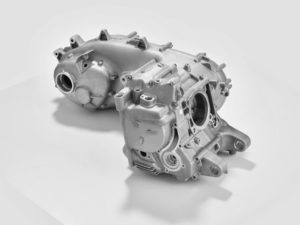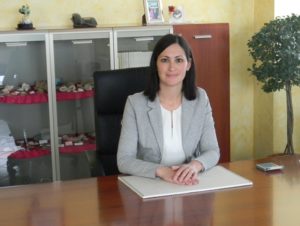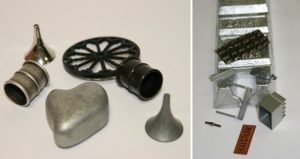We are proposing an all-round vision of the foundry world to our readers, to understand the main technological trends and how it is possible to be competitive.
Manufacturing techniques in foundry are among the most ancient and “consolidated”, therefore it is difficult to witness technological revolutions in this field. Then, how is it possible “to do innovation” in this sector? We asked it to four experts in as many leader Italian companies in the casting and die casting industry.
They have highlighted that innovation is achieved taking utmost care of each slightest detail in the manufacturing process and granting a reliable and timely delivery and after sale service.

Capricorn Fonderia S.r.l. (www.capricorngroup.net)
«It may seem contradictory but the old and apparently obsolete technology gravity die casting of metals in sand moulds is still an interesting technique for the production and the development of new projects in countless mechanical applications». With these words starts Annibale Cecconi, managing director of Capricorn Fonderia S.r.l. (Modena, MO), company operating in the production of motors, gear motors and aluminium components for cars (especially sports), motorbikes and ships. The enterprise is part of Capricorn Automotive Gmbh, European Group with headquarters in Dusseldorf (Germany), specialized in the manufacturing of automotive components for motorsport.
How is it possible to be competitive in this sector today? «It is possible thanks to the constant commitment of all the players of the manufacturing chain, whose ultimate goal must be the “constant improvement” of the product quality». This means that today the capability of supplying high-quality components makes the difference: «Our aluminium alloy castings are manufactured to satisfy the severe requisites of the automotive field that characterizes the Modena area. Over the years, this has allowed us to penetrate other sectors requiring high supply standards and to grow on the European market, too».

Annibale Cecconi adds: «Most of our latest investments have been aimed at meeting our customers’ quality demands». Therefore, Capricorn Fonderia has introduced analysis instruments in the acceptance phases of raw materials and of the components used in productions, control systems of castings before and after the heat treatment and testing methods such as radioscopy, penetrating liquids, dimensional controls and tightness tests before the shipments to customers. Cecconi adds: «Today sand foundry processes assure the achievement of characteristics hardly attainable before. It is possible, for instance, to obtain geometrical tolerances of ±3 tenths of mm in some values, thicknesses under 3 mm, elongations up to 5-7% and aesthetical effects comparable to the products implemented by chill casting. They are results that positively surprise technicians and engineers».

Cast System S.r.l. (www.castsystem.it)
For over 25 years, Cast System S.r.l. (Castelli Calepio, BG) has worked in the Zamak die casting on a world scale. Paola Brevi, sales manager of the company, explains the details: «Zamak is one of the most common zinc alloys. It is a material characterized by great resistance, hardness and ductility, used in several fields». The production by Cast System, in fact, addresses different outlet sectors: fashion, sacred art, technical articles for furnishing, sports medals, small industrial metal parts for components, housewares, lighting technique and so on. Paola Brevi: «We produce small-size parts, whose weight can vary from 1 gram to 1 kilo. We decisively focus on the three-dimensional design, with the aid of structural calculations». The company, which also avails itself of a 3D printer for the rapid prototyping of plastic parts in order to assess aesthetics and sizes of the pieces that will be then made of Zamak, designs and implements also the related steel dies. Cast System grants also a finishing service of Zamak die-cast items, through cleaning and vibro-tumbling processes and surface galvanic treatments outsourced to qualified partners.
In other words, today there is not a “unique” technology that can make the difference but the synergy of more technologies and activities makes a foundry able to meet the challenging market requireme

nts. Paola Brevi confirms «Today being competitive means optimizing each phase of the manufacturing cycle. We choose Zamak, for instance, according to the type of item to be implemented, i.e. according to the different hardness, elasticity and resistance requisites, and, in any case, we operate only with the best raw materials available on the market. Moreover, Cast System recognizes the importance of the automation and of the digital integration of the various systems». It uses, for instance, vertical robotic warehouses for the stocking and handling of semi-finished goods, of tools and equipment; moreover, it uses automated systems for the assembling of some products. «Today – ends Paola Brevi –the highlight of a foundry like ours is offering a highly technical, flexible and as “broad” as possible service».
In the next issue:
EDR Fittings S.r.l
Garmetal S.r.l



